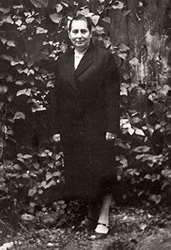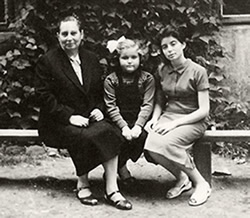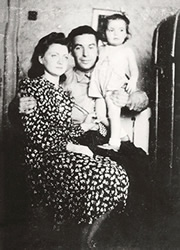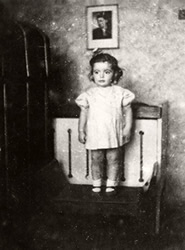Bronislava Krištopavi?ien?
Righteous Among the Nations
(Lithuania)
Bronislava Krištopavi?ien? was born in the Belorussian village of Kublichi in 1888. She moved to Lithuania, settled in Kovno (Kaunas) and remained there for the rest of her life. Her husband Povilas Krištopavi?ius, a Lithuanian army officer, was arrested by the Soviet authorities in 1940 and perished in a Siberian camp. Left alone with their teenaged son, Krištopavi?ien? secured a position as a medical nurse in one of the local hospitals, where she worked for many years.
In the spring of 1944, Krištopavi?ien? was approached by a prewar acquaintance, a young Jewish woman named Zinaida Levina née Sneider. In August 1941, Zinaida, her husband Grigoriy Levin and her parents had been imprisoned in the Kovno Ghetto. In September 1941, Zinaida had given birth to a baby daughter, Anita. Despite the harsh living conditions, lack of facilities for baby care and their constant hunger, the family had managed to keep Anita safe. The little girl's chatter and laughter filled their lives with meaning. Anita was hidden during the “Children’s Aktion,” launched in the ghetto on March 27-28, 1944, and now her parents were urgently looking for someone to shelter her outside of the ghetto.
Krištopavi?ien? readily agreed to help. One evening, she entered the ghetto together with a Jewish labor brigade, and in the morning she left in the same manner, carrying a potato sack containing the toddler, put to sleep by soporific medicine. They stayed for a while with Krištopavi?ien?'s friends, where little Anita got used to her rescuer and learned Lithuanian. In the summer they returned to Krištopavi?ien?'s apartment in the city, where Anita was introduced as Krištopavi?ien?'s orphaned relative.
Krištopavi?ien? sent a note to Anita’s mother in the ghetto, letting her know that they were back in Kovno. During the liquidation of the ghetto in July 1944, Zinaida ran away to her friend's apartment. Another Jewish couple by the name of Kasimov also found refuge there. All of them survived to see the liberation of Kovno by the Red Army on August 1, 1944. Grigory Levin and Josef Sneider, Anita’s father and grandfather, were deported to the Dachau concentration camp, where they both died. Her grandmother, Sterla Sneider, was killed in the Estonian Salaspils camp.
After the war, her mother’s second husband adopted five-year-old Anita, and the couple chose not to tell their daughter about her biological father. The family settled in Vilnius, but kept in constant touch with Krištopavi?ien?, visiting and helping her, especially following the tragic murder of her only son by nationalist bandits. Krištopavi?ien? passed away in Kovno in 1969, at the age of 81. Anita Friedberg and her offspring still cherish her rescuer's memory.
On December 25, 2006, Yad Vashem recognized Bronislava Krištopavi?ien? as Righteous Among the Nations.
Bronislava Krištopavi?ien? was born in the Belorussian village of Kublichi in 1888. She moved to Lithuania, settled in Kovno (Kaunas) and remained there for the rest of her life. Her husband Povilas Krištopavi?ius, a Lithuanian army officer, was arrested by the Soviet authorities in 1940 and perished in a Siberian camp. Left alone with their teenaged son, Krištopavi?ien? secured a position as a medical nurse in one of the local hospitals, where she worked for many years.
In the spring of 1944, Krištopavi?ien? was approached by a prewar acquaintance, a young Jewish woman named Zinaida Levina née Sneider. In August 1941, Zinaida, her husband Grigoriy Levin and her parents had been imprisoned in the Kovno Ghetto. In September 1941, Zinaida had given birth to a baby daughter, Anita. Despite the harsh living conditions, lack of facilities for baby care and their constant hunger, the family had managed to keep Anita safe. The little girl's chatter and laughter filled their lives with meaning. Anita was hidden during the “Children’s Aktion,” launched in the ghetto on March 27-28, 1944, and now her parents were urgently looking for someone to shelter her outside of the ghetto.
Krištopavi?ien? readily agreed to help. One evening, she entered the ghetto together with a Jewish labor brigade, and in the morning she left in the same manner, carrying a potato sack containing the toddler, put to sleep by soporific medicine. They stayed for a while with Krištopavi?ien?'s friends, where little Anita got used to her rescuer and learned Lithuanian. In the summer they returned to Krištopavi?ien?'s apartment in the city, where Anita was introduced as Krištopavi?ien?'s orphaned relative.
Krištopavi?ien? sent a note to Anita’s mother in the ghetto, letting her know that they were back in Kovno. During the liquidation of the ghetto in July 1944, Zinaida ran away to her friend's apartment. Another Jewish couple by the name of Kasimov also found refuge there. All of them survived to see the liberation of Kovno by the Red Army on August 1, 1944. Grigory Levin and Josef Sneider, Anita’s father and grandfather, were deported to the Dachau concentration camp, where they both died. Her grandmother, Sterla Sneider, was killed in the Estonian Salaspils camp.
After the war, her mother’s second husband adopted five-year-old Anita, and the couple chose not to tell their daughter about her biological father. The family settled in Vilnius, but kept in constant touch with Krištopavi?ien?, visiting and helping her, especially following the tragic murder of her only son by nationalist bandits. Krištopavi?ien? passed away in Kovno in 1969, at the age of 81. Anita Friedberg and her offspring still cherish her rescuer's memory.
On December 25, 2006, Yad Vashem recognized Bronislava Krištopavi?ien? as Righteous Among the Nations.



